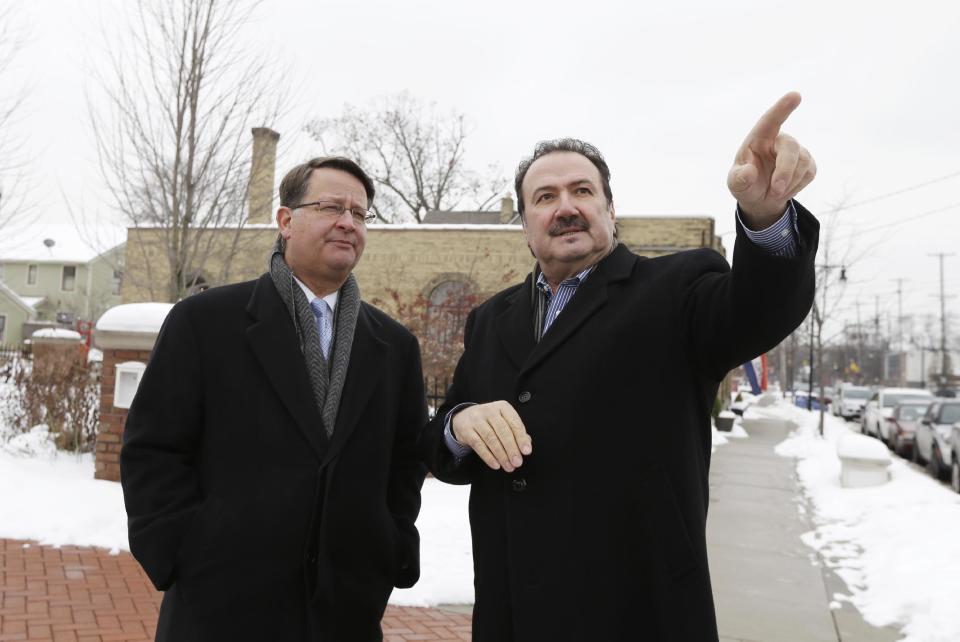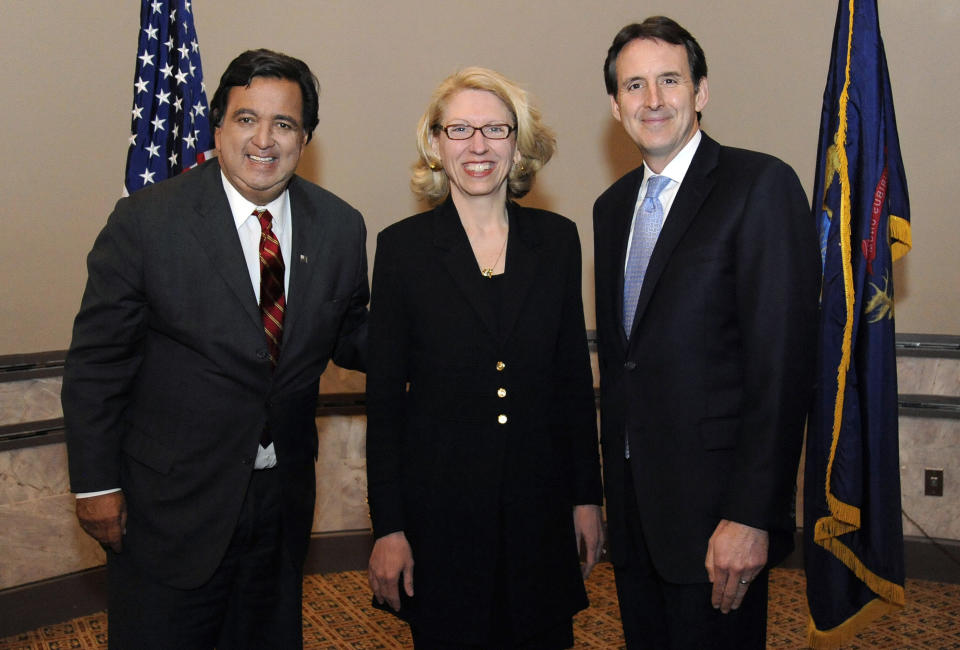Michigan's Peters plows different Democratic path
PONTIAC, Mich. (AP) — Mark Ammel and a co-worker were cleaning their sandwich shop around closing time when they looked up to see something they had never witnessed in the decade they've been in business.
Standing just inside the door was Senate hopeful Gary Peters, shaking off the snow and subzero chill and shaking a few hands in a place where Democrats seldom succeed and even more rarely visit.
"I don't recall ever seeing a Democratic candidate for state office here," said Ammel, a 33-year-old native of Escanaba on Michigan's remote Upper Peninsula. "This little town is pretty conservative."
In his quest for votes, the three-term congressman is venturing to a lot of places where his party's candidates don't normally go, seeking support from people who don't normally back Democrats and saying things they might not expect to hear from a Democrat.
His strategy reflects a wider truth: In the fall election, Michigan Republicans have a good chance of keeping the governor's office, the Legislature and majority of the state's U.S. House delegation.
So Peters is performing a complicated balancing act — trying to broaden the Democrats' midterm electorate by winning over some GOP voters while remaining true to the party's shrinking urban, labor-based core.
The bookish former banker from Michigan's biggest suburban county has promoted his support for the federal auto bailout, while also touting his co-authorship of the 2010 Small Business Lending Act, which diverted money from the 2008 Wall Street bailout to local banks to aid local businesses seeking money to expand.
He voted against increasing the debt limit three years in a row and has teamed with Republican Rep. Cory Gardner of Colorado on pending legislation to require agency heads to defend their budgets line by line.
In the past, statewide Democratic candidates have over-relied on Detroit's shrinking base. President Barack Obama was able to carry Michigan twice by drawing large numbers of votes from Detroit minorities that have eluded white statewide Democrats.
Compounding the challenge is a change in Democratic voting, which has dropped off sharply in recent Michigan midterm elections, a result of Detroit's dwindling population and organized labor's declining membership. So suburban counties have become Michigan's swing-voting battleground.
Peters is "not a typical Democrat," said Jan Dolan, a Republican former state lawmaker and Peters supporter from pivotal Oakland County, northwest of Detroit.
If a few other Democrats who are running to the middle in even more conservative states can strike that delicate balance, they might help hold off the GOP's all-out advance on Democrats' fragile Senate majority.
Peters' tack is not much different than that of Democrat Michelle Nunn, who is running to represent Georgia in the Senate. She says she's opposed to renewing the assault weapons ban and believes in former President Bill Clinton's moderate mantra that abortions be "safe, legal and rare."
In Montana, Sen. John Walsh, who was recently installed to serve out the term of retired Democratic Sen. Max Baucus, is campaigning to win the seat in his own right by promoting his 33 years in the National Guard, including a combat tour in Iraq.
Last December, Peters campaigned in conservative western Michigan, visiting businesses and Chambers of Commerce in Grand Rapids and Kalamazoo. In February, he spent six days in the Upper Peninsula, home to just 3 percent of Michigan's 7.4 million voters and a place where Republican Mitt Romney won more votes than Obama in 2012.
It's the kind of area where Peters might be regarded skeptically for supporting Obama's health insurance overhaul. But he could also point to his second vote just last month to delay the implementation of the insurance mandate for individuals, after the president allowed businesses to have an extra year to prepare.
As one of 27 Democrats to join majority Republicans, Peters frustrated Michigan Democrats on his left with the vote.
"I don't know who is giving Gary Peters advice on this," wrote Eric Baerren, owner and editor of the online MichiganLiberal.com. "It weakens him, not strengthens him."
The race with conservative Republican former Secretary of State Terri Lynn Land could come down to populous and economically diverse Oakland County. It's Peters' home but was carried by Republican Rick Snyder in his winning 2010 campaign for governor.
Peters' district winds from Detroit through miles of vacant office buildings and captures some of Michigan's most affluent suburbs.
Such swing-voting territory is crucial for Democrats in a state where voter participation drops sharply in midterm elections, and more among Democrats than Republicans.
The heart and mechanics of Michigan's Democratic machine — labor union membership — fell by 60 percent over the past 30 years. Meanwhile, Detroit's Democratic-heavy population dropped by even more.
So it says something that the state's top Republican has twice publicly praised Peters.
Gov. Snyder, who is seeking re-election this year and supports Land for Senate, applauded Peters' partnership with an Ohio Republican on a GOP-backed measure eliminating some environmental paperwork during a vehicle's sale. Snyder also praised Peters for proposing a new bridge and customs plaza linking Detroit with Windsor, Ontario, which the governor said would aid trade.
Some loyal Democratic voters have complained that Peters' moves have been conspicuously political.
"I occasionally roll my eyes at Gary," said Michigan Democratic strategist Mark Grebner. "He comes off as being a little calculated."
But Peters' efforts are welcome in a state where economic recovery means everything, said Florine Mark, a prominent businesswoman who is president of the state Weight Watchers Inc. franchise and who votes as an independent in Oakland County. She supports both Snyder and Peters.
"Not that I agree with him 100 percent of the time," Mark said of the governor. "He has his own voice.
"Gary is the very same way."




